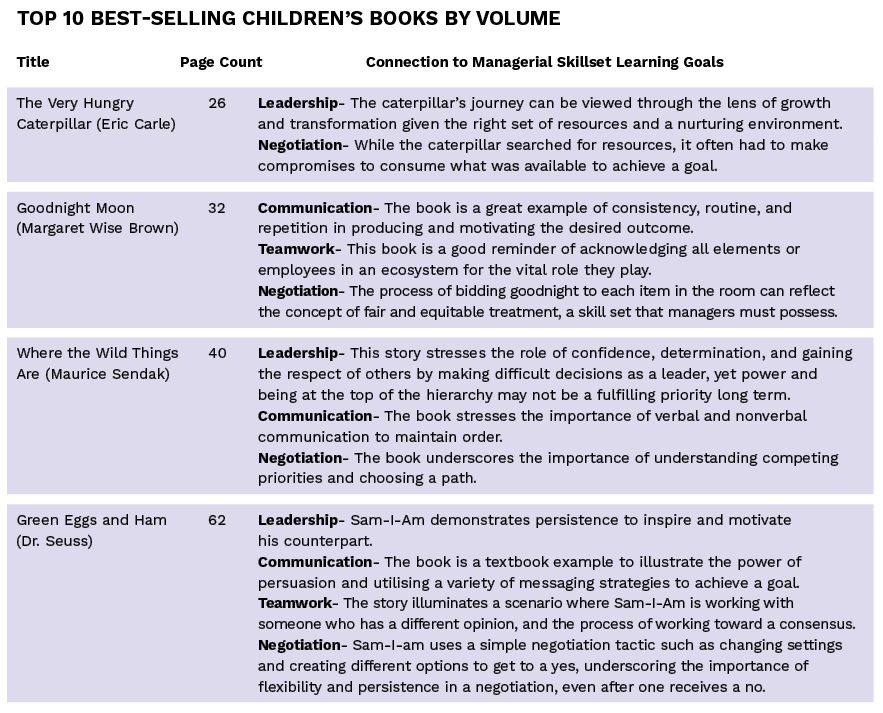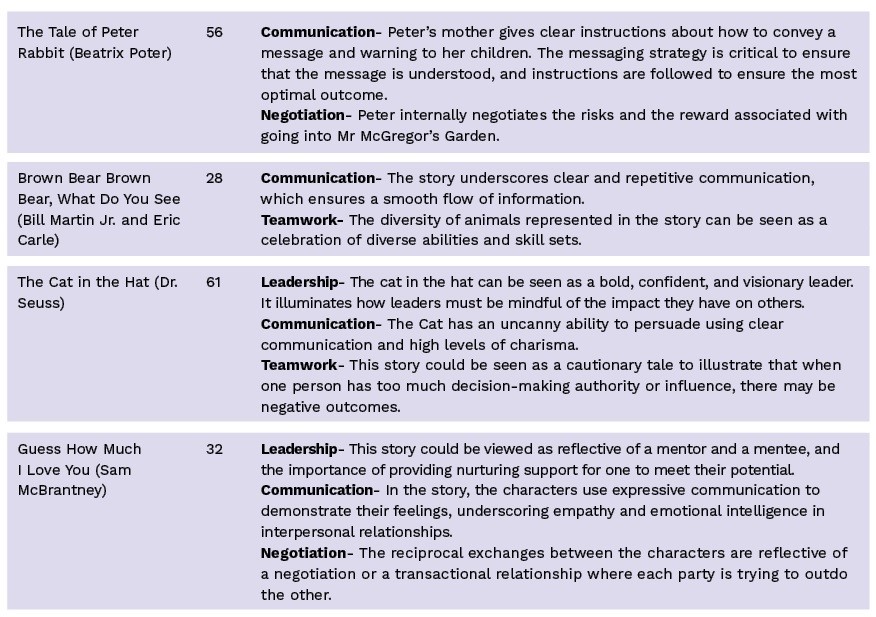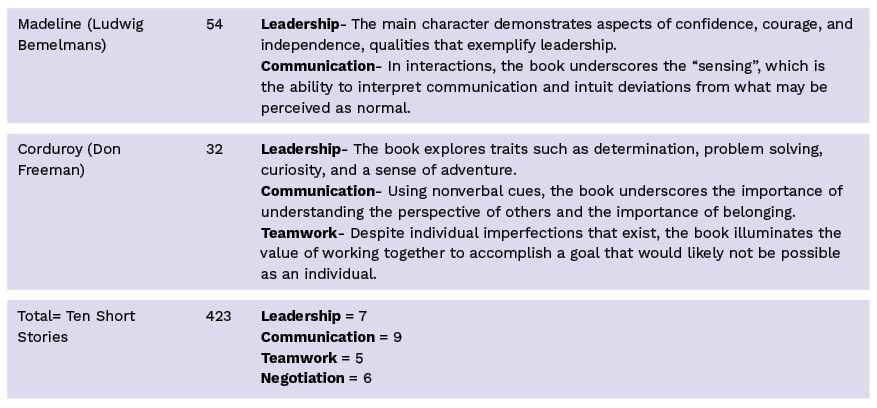By Jason Woldt and Mary Sue Woldt
What makes a great leader? Can children be trained for leadership right from the cradle? In this article, Jason and Mary Sue Woldt explain how children´s books and a robust reading culture help to develop emotional intelligence and the needed soft skills for managers.
The great NFL Hall of Fame coach Vince Lombardi (2023) said, “Leaders are not born, they are made.” Those who believe this to be true have long tried to determine the right skill set and training to cultivate a great leader. Using successful leaders as units of study, researchers have found the defining trait separating a good individual contributor from a good manager is a high level of emotional intelligence (i.e., soft skills) (Goleman, 2017). A leader with a high level of emotional intelligence can more easily defuse conflict, empathise with others, develop deeper relationships, and ultimately motivate better team performance. To that end, organisations spend billions of dollars every year on emotional intelligence and soft skills training (Research and Markets, 2022). Furthermore, expensive leadership graduate programmes continue to be in high demand as a viable path for mid-career professionals to develop and refine their managerial skill set and move up the corporate ladder. Yet, there is still a dearth of talent and a limited number of candidates who truly possess and desire the managerial skill set that is in such high demand. According to the US Bureau of Labor Statistics (2023), there are 1.1 million management vacancies each year, and the growth for management professionals over the next eight years is expected to outpace the total average growth across all other professions, demonstrating the current and future supply and demand imbalance.
In this paper, we address two fundamental questions:
What is the managerial skill set that is in such high demand?
How does one build the foundation for the managerial skillset early in one’s life?
The Managerial Skillset In High Demand
Measuring the managerial skillset can be difficult to define and assess. As such, we seek insights from the profession to understand what organisations most desire. The World Bank in collaboration with LinkedIn publishes data showing how professional skill requirements have changed over time using updates made to member profiles (World Bank, 2023). When LinkedIn members update the skills in their profiles, they do so to reflect the valued needs of their professions. The data collected from 2015- 2019, show that the top four soft skills for managers and management consultants were: 1.) Leadership 2.) Communication 3.) Teamwork and 4.) Negotiation. Interestingly, there was little deviation associated with the rankings of these skills across the five years. Furthermore, the mass of literature that exists on these topics suggests that these same managerial soft skills have been in demand for decades.
Building The Managerial Skillset
While training at any stage of life can be beneficial, simple exposure to positive examples at a very young age can lay the groundwork for one to learn managerial norms and mimic best practices, giving one a head-start in developing important managerial and life skills.
Acquiring the managerial skillset can also be challenging with many managers finding themselves unprepared for the role. Research shows that developing high levels of emotional intelligence and a wide breadth of soft skills requires training, experience, and deliberate practice (Cooper, 1997). This raises the question of why the formal training process starts so late in one’s life. While training at any stage of life can be beneficial, simple exposure to positive examples at a very young age can lay the groundwork for one to learn managerial norms and mimic best practices, giving one a head-start in developing important managerial and life skills. This paper uncovers the important linkages between the themes in bestselling children’s books and the managerial soft skills that are in such high demand, making the case for more exposure and deliberate practice earlier in one’s life.
Children’s Literature As A Deliberate Practice
Before one can read or even speak, managerial training tools exist in the simplest form: children’s books. Reading, especially nonfiction, can broaden one’s exposure to new information and expand one’s vocabulary, anchoring experiences, and allowing one to keep an open mind in difficult situations. Research shows that the single biggest reading success factor is reading aloud to children (Trelease, 2013). Furthermore, the American Academy of Pediatrics (2021) recommends reading aloud to children as young as six months old. It is no surprise that many of our nation’s most successful business CEOs are known to engage in this deliberate practice by reading several hours a day (Warren Buffet, Mark Cuban, Bill Gates, and Oprah Winfrey) (Seifert, 2020).
As a society, if we want managers to possess and model the traits that we most desire, it is imperative that we teach and reinforce those traits early to ensure there is a reasonable level of managerial literacy.
Engaging short stories consisting of colourful pictures and talking animals could be seen as allegories offering insight into real-life managerial scenarios. The elements of any children’s book consist of five components: 1.) characters 2.) plot 3.) setting 4.) conflict 5.) and theme. Comparable structural elements exist in any managerial environment. On a daily basis, managers must also navigate the complexities associated with 1.) internal and external stakeholders 2.) competing strategic objectives 3.) tenuous environmental factors 4.) personality conflicts 5.) business implications and performance assessments. Through stories, children are provided a pseudo stepping stone to a future managerial skillset. Sharing stories with cultural implications has been a foundation of civilisation. Stories rich in cultural meaning offer specific reference points that can consciously or subconsciously anchor behaviour. As a society, if we want managers to possess and model the traits that we most desire, it is imperative that we teach and reinforce those traits early to ensure there is a reasonable level of managerial literacy.
Parents and guardians should be aware of the influence that they have on a child’s early development. Research shows that two-thirds of a child’s lifetime vocabulary is formed by the age of two, underscoring the importance of exposure to children’s literature as a deliberate practice. During this period of neuroplasticity, repetitive exposure to words, phrases, concepts, and themes is critical for language development and formative in how a child makes associations (Trelease, 2020). Reading aloud is not only an efficient formula for scaffolding literacy development, but it builds emotional circuitry that allows children to wrestle with the chaotic journey of the human experience. Children who are read to early and often, benefit from rich oral tradition and deep emotional bonds with caring adults. Amid the widespread educational/mental health crisis, reading aloud can be considered a nutritional jumpstart to IQ and EQ.
Access to a wide variety of high-quality children’s literature has for decades been one of the great equalisers in our country. The free use of a wide variety of high-quality children’s books at public libraries across the country eliminates one of the larger financial barriers to entry. Yet, it is important to note that children cannot decide to pick up these books on their own. Arguably, the biggest barrier is the important role of parents and guardians in encouraging and promoting this deliberate practice. Research shows that it just takes reading aloud fifteen minutes per day to have a transformative impact on child development (Trelease, 2020).

Connections Between Children’s Literature And The Managerial Skillset
In any context, research shows that increasing one’s skillset to the level of expert requires deliberate practice (Gladwell, 2008; Ericsson, 2008). Being exposed to different scenarios, being forced to make decisions, and being assessed on the quality of those decisions enable managers to fine-tune their skill set. While we acknowledge there is no good substitute for managerial experience when one is a manager, we argue that regular exposure to high-quality children’s literature allows a path to model that same deliberate practice when one is only a child. In the Appendix, we show the direct connection between ten of the bestselling children’s books and the elements of the managerial skill set. By following the suggested deliberate practice of just reading fifteen minutes per day, this reading list can serve as a starting point that can be completed in less than a month (423 pages * 1 minute per page/ 15 minutes per night= 28.2 days.
Empowering children to eventually take the career path they most desire is always good practice but enabling them to have the most opportunity should be a best practice. Exposure to stories where characters encounter diverse challenges offers potential managers in training heartwarming and simple reminders that reinforce interpersonal and managerial best practices paving a path from cradle to manager. Albert Einstein said, “If you want your children to be intelligent, read them fairy tales. If you want your children to be more intelligent, read them more fairy tales.”
Appendix



About the Authors
Jason Woldt – University of Wisconsin Oshkosh. Email: [email protected]. Dr Jason Woldt is an Associate Professor and Department Chair of Supply Chain Management at the University of Wisconsin Oshkosh. With 20 years of experience in industry and academia, he published ten peer-reviewed articles in top management journals focusing on topics related to supply chain disruptions and big data.







![“Does Everyone Hear Me OK?”: How to Lead Virtual Teams Effectively iStock-1438575049 (1) [Converted]](https://www.europeanbusinessreview.com/wp-content/uploads/2024/11/iStock-1438575049-1-Converted-218x150.jpg)





















![“Does Everyone Hear Me OK?”: How to Lead Virtual Teams Effectively iStock-1438575049 (1) [Converted]](https://www.europeanbusinessreview.com/wp-content/uploads/2024/11/iStock-1438575049-1-Converted-100x70.jpg)




